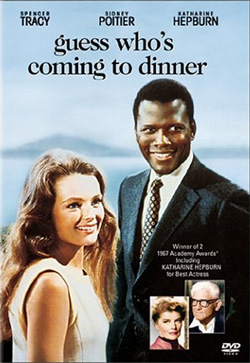|
Intermix.org.uk is a website for the benefit
of mixed-race families, individuals and anyone who feels they have a multiracial
identity and want to join us. Our mission is to offer a view of the mixed-race experience, highlighting icons, film, books, poetry, parenting techniques, celebrities, real lives and much more. Our online forums are a great place to meet others, ask questions, voice your opinions and keep in touch. Sign up for our monthly newsletter and delve into our pages. Want to join in? Become an Intermix member to take part: |
Guess Who's Coming To Dinner
 Made in 1967 when mixed-race marriages were still illegal in 16 states in America, Guess Who's Coming To Dinner,
was the first Hollywood film to give it's subject an optimistic ending.
Made in 1967 when mixed-race marriages were still illegal in 16 states in America, Guess Who's Coming To Dinner,
was the first Hollywood film to give it's subject an optimistic ending.
Starring Sidney Poitier, Spencer Tracey
and Catherine Hepburn Guess Who's Coming To Dinner is the story of Johanna Drayton, a young White American
woman who meets Dr John Prentice (Poitier), on holiday in Hawaii.
After a whirlwind romance the two decide to marry. The movie centers around Johanna's return to her upper class
American home, the introduction of her new fiancé to her parents over a family dinner and the reaction of family
and friends to their relationship.
Made in 1967 when mixed-race marriages were still illegal in 16 states in America, Guess Who's Coming To Dinner,
was the first Hollywood film to give it's subject an optimistic ending.
The film examines the unique relationships of all the central characters as well as the matter of society's none
acceptance of mixed-race marriages and, the probable persecution of their children.
Poitier was first approached by Director Stanley Kramer in 1966 to star in the film. Kramer stated in an interview
at the time that he felt the question of race relations could be explored in a motion picture in very personal terms
and in such a way that any moviegoer could relate to the characters.
Spencer Tracy who played the part of Matt Drayton, Johanna's father died just ten days after the film was finished.
Guess Who's Coming to Dinner went on to become Columbia's highest-grossing theatrical feature to date, taking in
$25 million. The film's success was also responsible for making Poitier the first Black box office star in history
and one of Hollywood's most popular actors. Poitier cited Stanley Kramer the film's director in the list of directors,
writers and producers who had helped make his phenomenal career a success, at the 2002 Academy Awards.
Have you seen this film? Why not tell us your views in the forums, click here:
